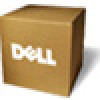Dell 5310n Mono Laser Printer User's Guide - Page 48
Letterhead - ink
 |
View all Dell 5310n Mono Laser Printer manuals
Add to My Manuals
Save this manual to your list of manuals |
Page 48 highlights
The following papers are not recommended for use with the printer: l Some chemically treated papers used to make copies without carbon paper, also known as carbonless papers, carbonless copy paper (CCP), or no carbon required (NCR) paper l Preprinted papers with chemicals that may contaminate the printer l Preprinted papers that can be affected by the temperature in the printer fuser l Preprinted papers that require a registration (the precise print location on the page) greater than ±0.09 in., such as optical character recognition (OCR) forms In some cases, you can adjust registration with your software application to successfully print on these forms. l Coated papers (erasable bond), synthetic papers, thermal papers l Rough-edged, rough or heavily textured surface papers or curled papers l Recycled papers containing more than 25% post-consumer waste that do not meet DIN 19 309 l Recycled paper having a weight less than 60 g/m2 (16 lb) l Multiple-part forms or documents Letterhead For the best print quality, use 75 g/m2 (20 lb) xerographic, grain long paper. Try a sample of any paper you are considering using with the printer before buying large quantities. When loading letterhead, note the recommended print side on the paper package, and load paper accordingly. In the paper tray Simplex (single-sided) printing Duplex (double-sided) printing In the multipurpose feeder Paper Characteristics The following paper characteristics affect print quality and reliability. We recommend that you follow these guidelines when evaluating new paper stock. The laser printing process heats paper to high temperatures of 230°C (446°F). For Magnetic Ink Character Recognition (MICR) applications and for non-MICR applications, use only letterhead able to withstand these temperatures without discoloring, bleeding, or releasing hazardous emissions. Check with the manufacturer or vendor to determine whether the paper you have chosen is acceptable for laser printers. Paper Weight















